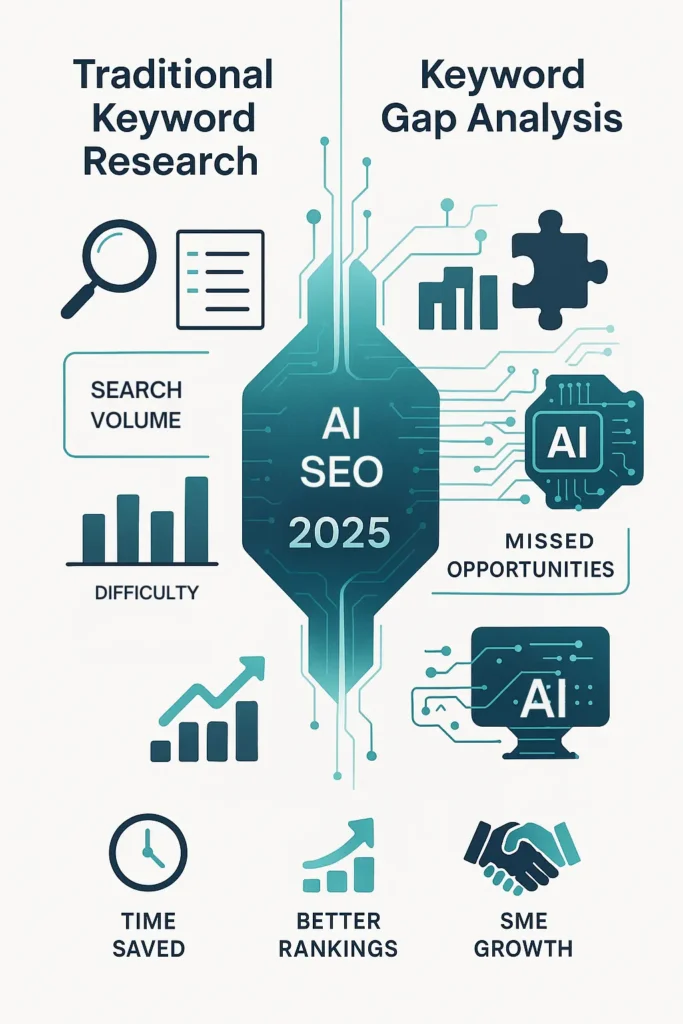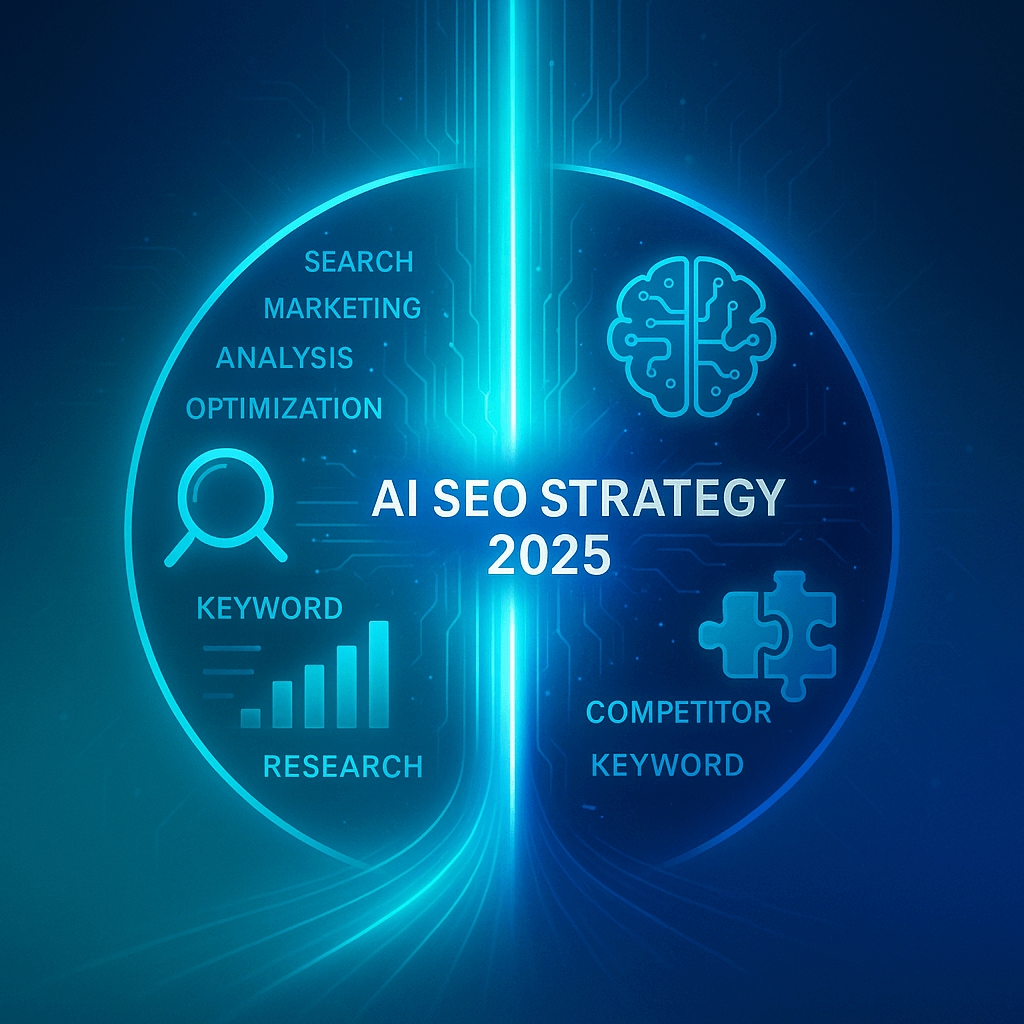SEO keeps changing, doesn’t it? Traditional keyword research has been the go-to for years, but now it’s teaming up with methods like keyword gap analysis. Heading into 2025, AI is shaking things up in content and what users are after. That’s why figuring out how these differ is crucial for getting ahead online. Especially for small businesses in competitive landscapes like Singapore, nailing this can convert raw data into real customers and sales.
Keyword research? It’s like throwing a big net to snag search terms. Keyword gap analysis, though, spots what your rivals are getting that you’re not. Add AI, and you’ve got tools that fit right into today’s search ways. For those seeking AI SEO services in Singapore, tailored approaches like these can unlock untapped potential in your digital presence. But knowing the basics, differences, similarities, and when and how to use AI boosts will help your SME make it all click.
What is Traditional Keyword Research?
Traditional keyword research aims to identify the search terms your audience types in to find products or services. You brainstorm seed keywords, then check things like search volume, difficulty, and user intent. Old favourites like Google Keyword Planner or basic spreadsheets help pull together lists that shape your content. If you’re running an online shop, you’d look at phrases like “best wireless earbuds” to decide if they’re a good bet.
What is Keyword Gap Analysis?
Keyword gap analysis is almost the opposite: it compares your site’s keywords to what competitors are winning with. The goal? Pinpoint those “gaps” – keywords they’re ranking for that you’re missing out on. It’s not all about high numbers. Most of the time, relevance and fresh chances matter too. Throw AI into the mix, and it automates the whole process, picking out word twists or longer phrases you’d probably skip. We’ve dug into how AI keyword research changes the game by letting machines do the grunt work, dodging slip-ups like overlooking seasonal shifts. Thanks to AI keyword gap analysis, small businesses can easily avoid some of the most common AI keyword research mistakes.
AI Content Gap Analysis vs. Keyword Research – How They Connect and Build on Each Other
Here’s the neat part: keyword gap analysis usually piggybacks on traditional research. You kick off with a wide keyword net, then zoom in on overlooked spots to fill content holes. This feeds into bigger plans, like in our guide to AI content gap analysis for SMEs, where spotting gaps helps create solid topic clusters.
Where AI Content Gap Analysis and Keyword Research Diverge in Practice

Of course, both methods chase similar aims like better search visibility, but their approaches and outcomes differ, especially with AI in play. Traditional keyword research? Hands-on and slow, locked on solo stats like monthly volume or difficulty. Solid for starters, yet it misses the bigger picture – a vital factor in Singapore’s fierce digital marketing arena.
Keyword gap analysis, particularly when enhanced by AI, shifts the focus to competitive intelligence. It reveals not just what keywords to target, but why – by showing where your content falls short in coverage or authority. For example, suppose a competitor ranks for “voice search optimisation tips” and you don’t. In that case, that’s a gap worth closing, especially as voice queries continue to rise in popularity, which we cover in depth in our article on voice search optimisation.
Aspect | Traditional Keyword Research | AI-Enhanced Keyword Gap Analysis |
Primary Focus | Discovering broad and specific keywords based on volume and intent. | Identifying competitive voids and untapped opportunities. |
Process | Manual brainstorming, tool-based data collection, and intuitive selection. | Automated scans of competitor rankings, semantic clustering, and predictions. |
Tools Involved | Basics like Google Trends or Ubersuggest for isolated insights. | AI platforms like SEMrush or Ahrefs for in-depth gap visualisation. |
Depth and Scale | Surface-level lists that мигхт overlook nuances. | Comprehensive analysis scaling to thousands of terms with trend forecasting. |
Time Efficiency | Can be labour-heavy, requiring ongoing manual tweaks. | Speeds up insights dramatically, often cutting time by 80%. |
Limitations | Risks of missing emerging trends or competitor edges. | Relies on quality data; needs human oversight for context. |
AI supercharges SEO efficiency: Tools slash keyword research time by up to 80%, letting teams swiftly fill content gaps. Unlike manual methods, it reveals hidden data patterns humans overlook, fueling smarter strategies.
Similarities: The Common Ground They Share
Despite their differences, these two aren’t rivals – they’re teammates in a strong SEO playbook. Both rely on data from search queries, user behaviour, and competitor landscapes to inform content. They aim to boost rankings, drive traffic, and ensure your site meets audience needs with compliant AI SEO content.
Moreover, traditional research often seeds gap analysis. You might use initial keyword findings to benchmark against the competition, creating a loop that refines your approach. In 2025, with AI SEO trends pointing toward more personalised search results, both methods adapt by incorporating elements like semantic intent and multimedia optimisation.
AI Boosts for Traditional Keyword Research
AI is no hype, and it’s evident by the way it shifted the SEO paradigm. Take traditional keyword research: it gets a real upgrade with features like predictive modelling and intent clustering. That means spotting trends early, before they blow up. It’s handy in fast-moving areas like conversational SEO, where you need to get those chatty queries just right.
AI Advantages in Keyword Gap Analysis
Switch to keyword gap analysis, and AI really shines by crunching huge piles of data in no time, finding spots you’d never catch by hand. Stats show firms using AI SEO tools see about a 25% bump in organic traffic, significantly outpacing traditional methods, thanks to smarter pattern spotting and quicker workflows. Plus, AI handles 44% of main SEO jobs, from keyword digs to content tweaks, cranking up efficiency and delivering up to 45% better results in traffic and conversions. That’s why small businesses are jumping on board—it turns data into actionable plans, similar to how AI-powered search engines focus on what users really mean, not just words.
When to Use Each in Your AI SEO Arsenal
Timing is everything. Lean on traditional keyword research for foundational work, like launching a new site or brainstorming content pillars. It’s ideal for quick wins in areas with low competition or when budgets are tight.
Reserve keyword gap analysis for competitive audits or scaling efforts. If you’re an SME optimising for local searches, use it to pinpoint where rivals dominate, then create targeted content to close the divide. A hybrid model works best: start with research to build your list, then apply gap analysis to refine it, as seen in effective AI search optimisation for SMEs.
Top AI SEO Tools to Get Started in 2025
No strategy is complete without the right toolkit. For traditional research, start with free options like Google Trends. Layer in AI boosts from platforms like Ahrefs or SEMrush – these shine in gap analysis with features like competitor keyword overlays. Other favourites include GetGenie AI for automated reports and Writesonic for integrating gaps into content briefs. Our roundup of the best AI SEO apps dives deeper into these, highlighting how they streamline workflows without breaking the bank.
Best AI SEO Practices: Making It Work for SMEs

To maximise impact, align both methods with user intent – map gaps to real services to avoid fluff. Stay compliant by validating AI suggestions against guidelines, and monitor trends regularly, especially with shifts in AI SEO strategies. Track success through metrics like organic traffic growth, and don’t forget to iterate.
Take this SME case: A Singapore-based retailer used traditional research to identify “sustainable fashion trends,” a hot topic in a market growing at 4.1% annually. AI gap analysis then revealed competitors’ ranking for terms like “eco-friendly fabrics in Asia.” By targeting these gaps, they significantly improved rankings in six months, capitalising on Singapore’s rising demand for sustainable fashion—a tactic reflecting broader AI SEO trends.
Wrapping It Up & The Path Forward in AI SEO Services with The Leading Solution
As 2025 unfolds, that divide between old-school keyword research and gap analysis is fading fast, all because AI is pulling them together. Get good at both, and SMEs like yours can build strategies that hold up against whatever Google throws next, bringing in solid, long-term results. No matter if you’re steering clear of those usual AI keyword slips or stacking up topic clusters, it’s all about researching for scope and using gap analysis to add the edge.
Ready to bridge your own keyword gaps? Contact The Leading Solution for a free site audit today, and let’s optimise your strategy together.


